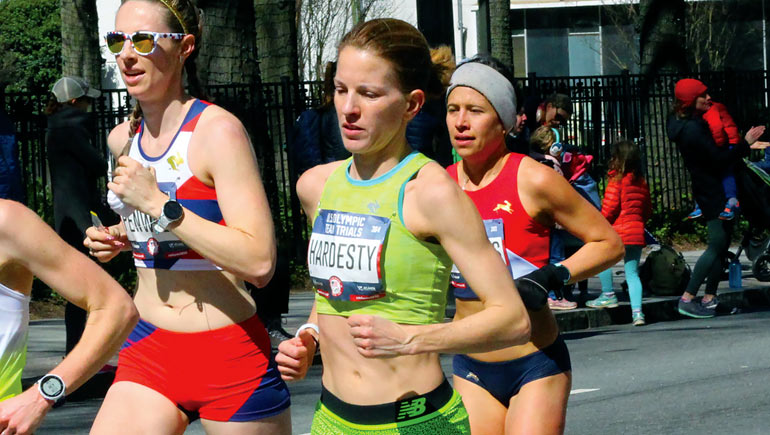Working and running at different speeds

Melissa Hardesty knows all about slow and steady winning the race. An assistant professor of social work at Binghamton, she has spent a few years on a single research project.
Her hobby is very different. Hardesty also runs marathons — and she qualified for the 2020 Olympic Trials.
Hardesty’s latest paper, “Political Selfies and the Paradox of Giving Voice to Virtual Bodies,” published in Feminist Formations, Projecst MUSE by Johns Hopkins University Press, began when she noticed articles criticizing women who participated in an online trend of political selfies. The women held up a sign or whiteboard with phrases such as, “I don’t need feminism because…” and Hardesty wanted to understand the reasoning.
Hardesty learned the photos responded to a Duke University project where students were asked to complete the phrase, “I need feminism because…” on a whiteboard. Though the photo series was shared widely online, the “anti-feminist” pictures received more attention.
Hardesty says political selfies in the digital age raise unique challenges; for instance, it can be hard to discern if an image is authentic because of the abundance of filters and editing apps.
“I think I can say pretty confidently, in part because of the way people react to photos, that people see pictures as being a snapshot of something that’s real,” Hardesty says.
While Hardesty’s academic projects can take years to complete, her journey to the finish line of a marathon is much faster: 2 hours, 44 minutes and 10 seconds to be exact. Completing the Toronto Waterfront Marathon in that time made her eligible to try out for the 2020 Olympics.
“I have no shot of making the Olympic team,” Hardesty said with a laugh before the trials, held Feb. 29 in Atlanta.
The trials were granted gold status by USA Track and Field; the top three runners from the men’s and women’s categories will go on to the 2021 Summer Games in Tokyo.
Hardesty was 191st out of the 390 women who finished, and 361st overall out of 565 runners. She finished in the top 60th percentile, with a time of 2 hours, 48 minutes, and 31 seconds — about five minutes more than her qualifying time.
Hardesty began running in 2006 for recreational purposes, but grew more serious about it as a doctoral student at the University of Chicago. She has been competing since 2008.
She describes her best races as the ones where she begins the race feeling less than ready but peaks around the 20th mile — when others may begin to fall in their speed. Her efficient use of energy to maintain a strong pace is an essential trait among successful marathoners.
When the weather gets below 20 degrees or roads are too icy, Hardesty trains on a treadmill. She sticks to a cycle of training, resting between marathons, then slowly working her way back to a competitive level in the weeks before a race.
Alana Gunn, assistant professor at the University of Illinois at Chicago, says Hardesty has always had the dedication of an Olympian.
“She qualified for the Olympic Trials one week and got an awesome paper accepted the next!” Gunn says.
